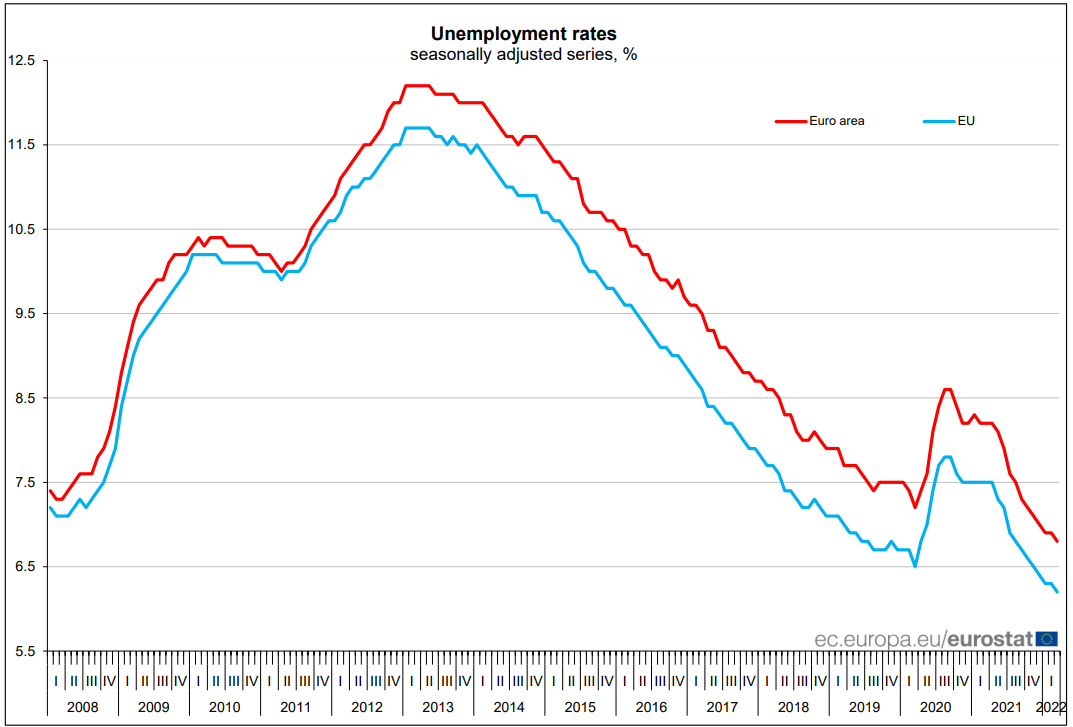Find a Job in Europe
The Euro Area’s seasonally-adjusted unemployment rate was 6.8% in March, down from 6.9% in February 2022. Eurostat estimates that 13.374 million men and women in the EU were unemployed in the same period (Eurostat,2022).
As a cooperation network formed by public employment services, EURES (European Employment Services) is an EU agency set up to facilitate employment mobility among the member states and to maintain a database of jobs as a valuable means to search and apply for jobs in the EU, EEA and Switzerland.

Figure 1: The Euro Area’s seasonally-adjusted unemployment rates
EURES (European Employment Services) provides more than four million job opportunities worldwide to local and foreign job seekers. These job opportunities are listed by country, sector, and job function for easy browsing. You must create a free job seeker account to access all site features. Then, you can have the opportunity to upload your resume, which will allow you to be discovered by national and international companies registered on the site. There are currently 4.343.465 (May 2022) jobs in EURES. Let’s see the statistical distribution of these job postings by country.

Figure 2: European Countries statistics by job posting on EURES
Germany and France are well adapted to the EURES and Belgium is the following well-adapted country despite Its 11.5 million population. Romania, Iceland and Italy, with its 60 million population, seem to be among the countries that cannot adapt well to the EURES The European Job Mobility Portal.

Figure 3: TOP 10 European Countries statistics by job posting on EURES
EURES reports that the most published job postings on the job search portal were in ‘Administrative and Support Service Activities. While just 544 jobs were published in the ‘Activities of Extraterritorial Organizations and Bodies’ group.

Figure 4: Sectoral statistics of job postings on EURES
The most published job postings on the EURES Job Portal are Shop Sales Assistants and Freight Handlers. Glass and Ceramics Plant Operators and Plastic Products Machine Operators are the least demanded jobs.

Figure 5: Occupational statistics of job postings on EURES
Standard employment (traditional) refers to a permanent and full-time work arrangement between an employer and employee. As an example, 22% of the Dutch job postings on EURES offer full-time employment.
Non-standard employment is a work arrangement between an employer and an employee that deviates from standard employment. Flexible and part-time jobs are considered forms of non-standard employment. 76% of Dutch job postings on EURES have a flexible work schedule, while the next 2% provide part-time jobs.

Figure 6: The Netherlands job postings work schedule on EURES
EURES Flag on EURES Job Mobility Portal represents the employers particularly interested in recruiting workers from other European countries. 99% of Dutch job postings on EURES don’t have the EURES Flag and offer employment for Dutch residents. Only 1% of job postings have the EURES Flag and are open for workers from other European countries.

Figure 7: Statistics of job postings in the Netherlands having the EURES flag
References
EURES. (2022). Find a job in Europe. European Commission. Retrieved May 30, 2022 from https://ec.europa.eu/eures/portal/jv-se/home?pageCode=find_a_job
Eurostat. (2022). Euro area unemployment at 6.8%. Eurostat. https://ec.europa.eu/eurostat/documents/2995521/14613608/3-03052022-AP-EN.pdf/36631a07-778c-efb0-01f2-8a052bde985e?t=1651561306689
